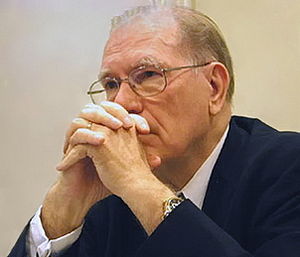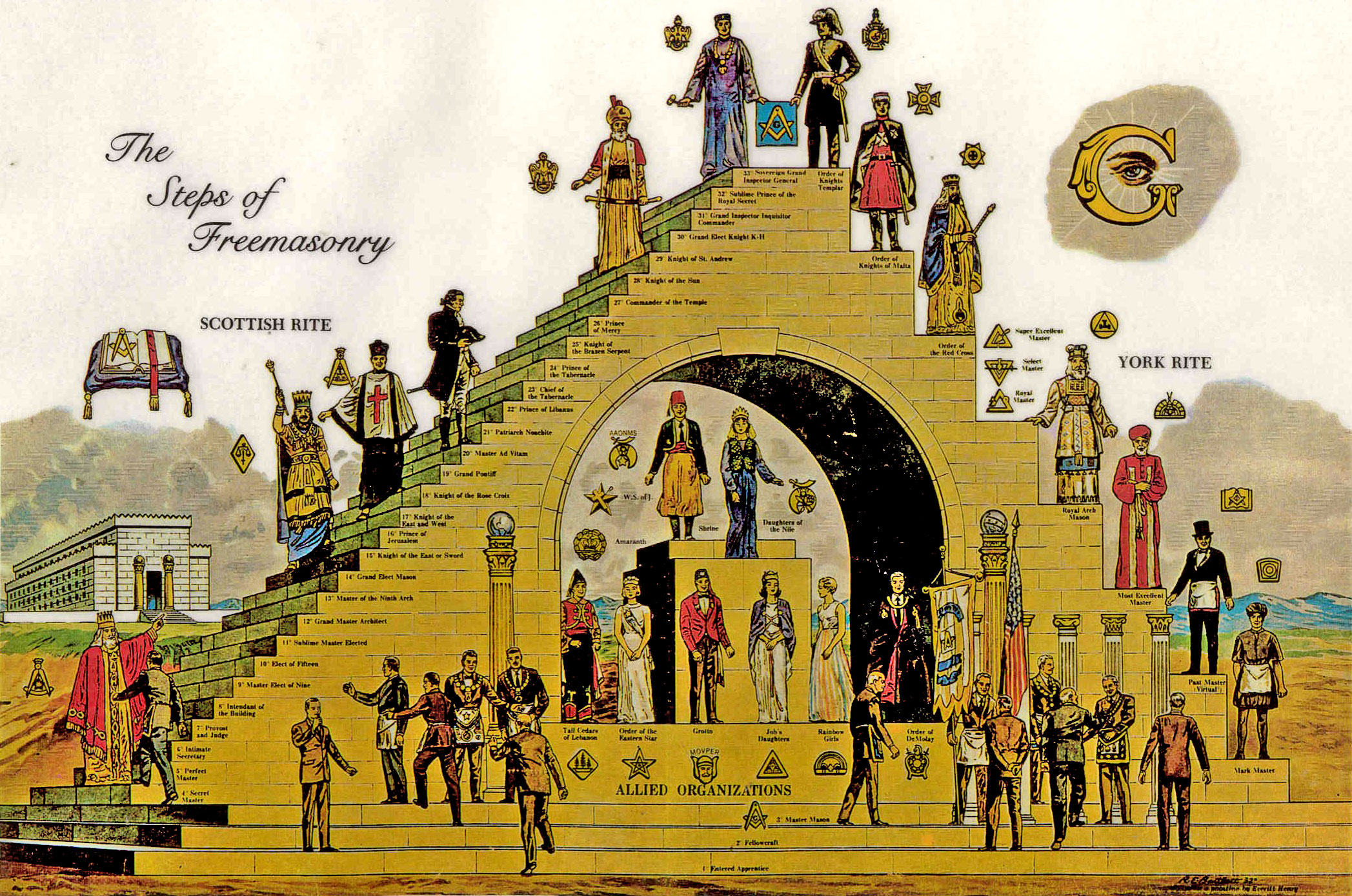Comenius addressed the first formal scientists as “illuminati” and outlined their scientific purpose, “…which is to secure…the empire of the human mind over matter.”
In the article entitled “The Ascendancy of the Scientific Dictatorship”, we examined the transmogrification of the elite’s religious power structure into a technocratic oligarchy legitimized predominantly by science. The history and background of this “scientific dictatorship” is a conspiracy, created and micro-managed by the historical tide of Darwinism, which has its foundations in Freemasonry. In this article, we shall examine the “scientific dictatorship” as an enormous project in the re-sculpting of reality itself.
The Technocracy
Freemason Aldous Huxley coined the term “scientific dictatorship” and presented an allegorized version of the concept in his famous roman ‘a clef entitled Brave New World. Huxley was mentored by Freemason H.G. Wells, who also presented a fictionalized “scientific dictatorship” under the appellation of the “Technocracy.” This is an interesting designation for a world government managed by functional elites and scientists. It is derived from the Greek word techne, which means craft. Given Wells’ membership in the Craft of Freemasonry, the synchronicity becomes apparent.
Moreover, the term craft is associated with witchcraft or wicca. From the term wicca, one derives the wordwicker (Hoffman, 63). Examining this word a little closer, Michael Hoffman explains: “The word wicker has many denotations and connotations, one of which is ‘to bend,’ as in the ‘bending’ of reality'” (Hoffman, 63). This is especially interesting when considering the words of Mark Pesce, co-inventor of Virtual Reality Modeling Language. Pesce writes: “The enduring archetype of techne within the pre-Modern era is magic, of an environment that conforms entirely to the will of being” (Pesce).
Techne is also from whence the word technology is derived. The significance of this fact becomes evident when Pesce opines:
Each endpoint of techne has an expression in the modern world as a myth of fundamental direction — the mastery of matter, and the collection of spirit. The myth of matter comes to its end as the absolute expression of will as artifact; in a word, nanotechnology (Pesce).
Herein is the final objective of New World Order … the reconfiguration of reality through the sorcery of technology.
Radical Empiricism: The Epistemological Pretext for Re-Sculpting Reality

As we have established in previous articles, most of contemporary science is predicated upon empiricism. This is the epistemological stance that all knowledge is derived exclusively through the senses. Lyndon LaRouche explains the inherent flaws of empiricism:
By the nature of our processes of sense-perception, our direct perception of the world “outside our skins” (so to speak) does not show us that world “outside our skins,” but, rather, the impact of that unperceived real world upon the biology of our mental-sensory processes. In other words, the shadows on the wall of Plato’s Cave (LaRouche).
Thus, the world becomes little more than an ever-shifting pliancy of impressions. All that a percipient surveys is an amorphous amalgam of “shadows.” It comes as little surprise that an exclusively empirical approach relegates causality to the realm of metaphysical fantasy. The obviation of causality holds enormous ramifications for science.
What is perceived as A causing B could be merely a consequence of circumstantial juxtaposition. Although temporal succession and spatial proximity are axiomatic, causal connection is not. Affirmation of causal relationships is impossible. Given the absence of causality, all of a scientist’s findings must be taken upon faith. Ironically, science relies on the affirmation of such cause and effect relationships. This is all one can deduce while working under the paradigm of radical empiricism. Thus, the elite merely exchanged one form of mysticism for another. It comes as little surprise that, within certain occult circles, contemporary science is considered sorcery disseminated on the popular level. For instance, Satanic high priest Anton LaVey regarded science and technology as “sanctioned, but ineffectual ‘occultism'” (Raschke, 214).
In fact, science has become a new form of sorcery for the manipulation of matter. According to the epistemology of empiricism, reality is little more than a quagmire of impressions. It is analogous to a holograph, the fabric of which is pliable enough to be manipulated. Thus, reality becomes the ever-shifting canvas upon which scientists paint whatever they wish. The scientist’s role in this reconfiguration of reality was delineated in an esoteric tract entitled The Way of Light. Authored by Comenius in 1668, the manifesto was dedicated to the British Royal Society. Researcher Michael Hoffman elaborates:
In it, Comenius addressed the first formal scientists as “illuminati” and outlined their scientific purpose,“…which is to secure…the empire of the human mind over matter” [emphasis added] (Hoffman, 23).

Years later, Bertrand Russell would recapitulate the “illuminati’s” (i.e., scientists’) role in the establishment of “the empire of the human mind over matter.” Redefining science as an instrument of radical empiricism, Russell wrote:
The way in which science arrives at its beliefs is quite different from that of medieval theology. Experience has shown that it is dangerous to start from general principles and proceed deductively, both because the principles may be untrue and because the reasoning based upon them may be fallacious. Science starts, not from large assumptions, but from particular facts discovered by observation or experiment. From a number of such facts a general rule is arrived at, of which, if it is true, the facts in question are instances… Science thus encourages abandonment of the search for absolute truth, which belongs to any theory that can be successfully employed in inventions or in predicting the future. “Technical” truth is a matter of degree: a theory from which more successful inventions and predictions spring is truer than one which gives rise to fewer. “Knowledge” ceases to be a mental mirror of the universe, and becomes merely a practical tool in the manipulation of matter [emphasis added] (Russell, 13 – 15).
In other words, science or “knowledge” becomes the instrument by which the “illuminati” re-sculpts reality. It also becomes an epistemological weapon against the minds of men, wielded by the proverbial Descartean “evil demon.” This was the central precept of Weishaupt’s Illuminati and the conceit of the Technocracy today: God was not in the beginning, but evolved from Man in the end. According to this conceit, Man could recreate Eden without the God. It comes as little surprise that sci-fi predictive programmer and British intelligence asset Arthur C. Clarke commented: “Any sufficiently advanced technology is indistinguishable from magic.”
The Global Holodeck
The technocratic agenda of reconfiguring the “holograph of reality” is most clearly delineated by William Sims Bainbridge, sociologist and member of the National Science Foundation. Citing sci-fi predictive programmer Gene Roddenberry, Bainbridge writes:

An interesting feature of the popular Star Trek universe is that mass-media popular culture is absent from its fictional future world. Several characters play musical instruments and the preferred styles of music are classical, whether European or belonging to some other high culture. Perhaps precisely because the characters are living very future-oriented lives, they turn to historical sources like Mozart for their aesthetic recreation. Presumably, the copyrights have all expired. Instead of passively watching television programmes and movies, they programme their own “holodeck” virtual reality dramas in which they play active roles, often with historical settings. Government is certainly not in the science fiction business, but government-encouraged research is currently developing the technology to realise the Star Trek prophecies (Bainbridge, “Memorials”).
Evidently, government-sponsored research programs are already dedicated to the Technocracy’s vision of re-sculpting reality. Bainbridge is certainly no stranger to this vision, as is evidenced by his association with Scientology. In Religion and the Social Order, Bainbridge presented a mandate for scientists to become “religious engineers” in the development of a new world religion (Bainbridge, “New Religions, Science, and Secularization”). This new world religion, which Bainbridge calls a “Church of God Galactic,” would find its origins with science fiction literature (Bainbridge, “Religions for a Galactic Civilization”). In the formulation of his “Church,” Bainbridge used the scientistic cult of Scientology as a working model:
Today there exists one highly effective religion actually derived from science fiction, one which fits all the known sociological requirements for a successful Church of God Galactic. I refer, of course, to Scientology (Bainbridge, “Religions for a Galactic Civilization”).
In the Scientologist bible, L. Ron Hubbard’s Dianetics, one finds a reiteration of Comenius’ mission statement delivered to the “illuminati” (i.e., scientists). Hubbard states:
Man has something more: some people call it imagination, some call it this or call it that; but whatever it is called, it adds up to the interesting fact that man is not content merely to “face reality” as most other life forms are. Man makes reality face him. Propaganda about “the necessity of facing reality,” like propaganda to the effect that a man could be driven mad by a “childhood delusion” (whatever that is), does not face the reality that where the beaver down his ages of evolution built mud dams and keeps on building mud dams, man graduates in a half century from a stone and wood dam to make a mill wheel pond to structures like Grand Coulee Dam, and changes the whole and entire aspect of a respectable portion of nature’s real estate from a desert to productive soil, from a flow of water to lightening bolts (Hubbard, 308).
It is very interesting that Hubbard would cite the Grand Coulee Dam as an instant when man “made reality face him.” Discussing the “Saturnian-masonic” era of erecting megalithic structures, Hoffman observes:
Actually, with some crucial exceptions, the rise of the megaliths marked the rise of the Hermetic Academy into its dominant physical phase. The theory is that the megaliths “pin down” natural forces, helping to subdue nature’s most savage furies. We marvel today at the Hoover Dam but that symbol laden construction is but a crude parody of the technology of the megaliths which helped to “dam” the wildest forces of nature (Hoffman, 21).
Evidently, men like Hubbard and Bainbridge see something entirely different when they view structures like the Grand Coulee Dam and the Hoover Dam. They are viewing the “endpoint of techne — the mastery of matter.” It is the Technocracy’s project in consciously shaping the terrain of the global holodeck.
The “Hive Mind”
As was established in the previous article covering this topic, Darwin’s theory of evolution was cribbed liberally from Freemasonry’s occult doctrine of “becoming.” According to this doctrine, humanity was gradually evolving towards apotheosis. The architecture of Masonry’s evolutionary mythology is a counterpart to the Biblical account humanity’s expulsion from Eden. However, there are some major modifications. In The Meaning of Masonry, W.L. Wilmshurst alleges that:
In all Scriptures and cosmologies the tradition is universal of a “Golden Age,” an age of comparative innocence, wisdom and spirituality, in which racial unity [emphasis added], and individual happiness and enlightenment prevailed; in which there was that open vision for want of which a people perisheth, but in virtue of which men were once in conscious conversation with the unseen world and were shepherded, taught and guided by the “gods” or discarnate superintendents of the infant race, who imparted to them the sure and indefeasible principles upon which their spiritual welfare and evolution[emphasis added] depended (Wilmshurst, 173).
However, Wilmshurst contends that a peregrination of human consciousness away from the “racial mind” caused humanity to fall from its former glory:
The tradition is also universal of the collective soul [emphasis added] of the human race having sustained a “fall,” a moral declension from its true path of life and evolution [emphasis added], which has severed it almost entirely from its creative source, and which, as the ages advanced, has involved its sinking more and more deeply into physical conditions, its splitting up from unity employing a single language into a diversity of conflicting races of different speeches and degrees of moral advancement[emphasis added], accompanied by a progressive densification of the material body and a corresponding darkening of the mind and atrophy of the spiritual consciousness (Wilmshurst, 173).
Recall Pesce’s statement that techne was expressed in the modern world as the “collection of spirit.” This is precisely the objective of Masonry… the “collection of spirit” through the facilitation of evolution! Wilmshurst proceeds to reveal the chief means by which this will be achieved:
Unable to effect its [Man’s] own recovery it required skilled scientific [emphasis added] assistance from other sources to bring about its restoration. Whence could come that skill and scientific [emphasis added] knowledge if not from the Divine and now invisible world, from those “gods” and angelic guardians of the erring race of whom all ancient traditions and sacred writings tell? Would not that regenerative method be properly described if it were called, as in Masonry it is called, a “heavenly science” [emphasis added], and welcomed in the words that Masons in fact use, “Hail, Royal Art!” (Wilmshurst, 175).
Can there be any wonder why Freemasons Aldous Huxley and H.G. Wells were proponents of a “scientific dictatorship?” It is an intrinsic feature of their Masonic heritage. This heritage led them to bestow absolute epistemological primacy upon Science, spelled with a “S” to denote its divine role in man’s purported ascent towards apotheosis and the reconstitution of the Masonic “collective soul.” This is scientism. In a speech before the Royal Institute of International Affairs in 1936, H.G. Wells succinctly expressed the core precept of scientism:
“At first the realization of the ineffectiveness of our best thought and knowledge struck only a few people, like Mr. Maynard Keynes, for example… It is science and not men of science that we want to enlighten and animate our politics and rule the world” (qutd. in Keith, Mind Control, World Control, 306 – 307).
Wells also wrote about the mythological “collective soul,” which he dubbed “The Mind of the Race.” W. Warren Wagar elaborates on Wells’ “racial mind” doctrine:
It was at once the capstone and the mortar of his [Wells’] faith: a belief in the emergence in human evolution of a collective racial being with the collective racial mind, which gathered the results of the individual mental effort into a single fund of racial wisdom and grew gradually toward organic consciousness of itself. Individuals could escape the frustration inherent in the fact of their individuality and mortality only by consecrating their lives to the service of the Mind of the Race (Wagar, 100 – 101).
Wells believed that the final coalescence of human consciousness into a “racial mind” would result in the emergence not of a mere man, but of perfected Man with a capitalized M (Wagar, 104). The M is capitalized to denote the purported divinity that is dormant within humanity. Wells’ Weltanschauung remained consistent with the Masonic themes of a “collective soul” and man’s evolutionary ascent towards deification. In H.G. Wells and the World State, author Warren Wagar elaborates:
But the transcendent reality Wells actually professed to see emerging here and now was the collective being of humanity, rather than any “God.” At the level of the individual the species Homo sapiens might be nothing more than a swarm of unique individuals descended in an unbroken sequence from remote protozoan ancestors; yet Homo sapiens was more than a name. At this moment in cosmic time it also denoted a class of similar if not identical individuals, evolving in ceaseless interaction with one another, and through the unique gift of speech able to pool their experiences and so give birth to a higher order of being entirely: a racial memory, a collective mind [emphasis added], the emergent intelligence of an emergent racial being (Wagar, 104).
According to Wells’ Weltanschauung, the ecumenical singularity into which humanity was being compressed by evolution would relegate the individual to obsolescence:
As Wells grew older, he tended to look at life more and more from the synthetic level of racial being and less and less from the analytical level of the individual. At the end of his spiritual pilgrimage he virtually accepted the realist argument that the whole is real and the individual an illusion (Wagar, 104).
William Sims Bainbridge may prove to be instrumental in the demise of the individual. In an article entitled “US report foretells of brave new world,” journalist Nathan Cochrane examines Converging Technologies for Improving Human Performance, a report edited and contributed to by Bainbridge:
A draft government report says we will alter human evolution [emphasis added] within 20 years by combining what we know of nanotechnology, biotechnology, IT and cognitive sciences. The 405-page report sponsored by the US National Science Foundation and Commerce Department, Converging Technologies for Improving Human Performance, calls for a broad-based research program to improve human performance leading to telepathy, machine-to-human communication, amplified personal sensory devices and enhanced intellectual capacity (Cochrane, 1).
Elaborating on this research program, Cochrane explains how this convergent-technologies plan would be instrumental in the unification of mass consciousness:
People may download their consciousnesses into computers or other bodies even on the other side of the solar system, or participate in a giant “hive mind”, a network of intelligences connected through ultra-fast communications networks. “With knowledge no longer encapsulated in individuals, the distinction between individuals and the entirety of humanity would blur,” the report says. “Think Vulcan mind-meld. We would perhaps become more of a hive mind – an enormous, single, intelligent entity” (Cochrane, 1).
Of course, preparations must be made for the humanity’s comfortable acclimation to this new “hive mind.” Cochrane writes:
The report says the abilities are within our grasp but will require an intense public-relations effort to “prepare key organisations and societal activities for the changes made possible by converging technologies”, and to counter concern over “ethical, legal and moral” issues. Education should be overhauled down to the primary-school level to bridge curriculum gaps between disparate subject areas (Cochrane, 1).
The “endpoint of techne” may be drawing nigh as the Technocracy constructs its global holodeck.
References
- Bainbridge, William Sims, “Religions for a Galactic Civilization,” excerpted from Science Fiction and Space Futures, edited by Eugene M. Emme. San Diego: American Astronautical Society, pages 187-201, 1982.
- Bainbridge, William Sims, “New Religions, Science, and Secularization,” excerpted from Religion and the Social Order, 1993, Volume 3A, pages 277-292, 1993.
- Bainbridge, William Sims, “Memorials,” excerpted from Social Sciences for a Digital World, edited by Marc Renaud. Paris: Organisation for Economic Co-Operation and Development, 2000.
- Cochrane, Nathan, “US report foretells of brave new world,” July 23, 2002.
- Hoffman, Michael, Secret Societies and Psychological Warfare, Independent History & Research, Coeur d’Alene, Idaho, 2001.
- Hubbard, L. Ron, Dianetics, Bridge Publications Inc., 1986.
- Keith, Jim, Mind Control, World Control, Adventures Unlimited Press, Kempton, Illinois, 1997.
- LaRouche, Lyndon, “The Pagan Worship of Isaac Newton,” Executive Intelligence Review, November 21, 2003.
- Pesce, Mark, “Ontos and Techne,” Computer-Medicated Magazine, April 1997.
- Raschke, Carl A., Painted Black, Harper Collins Publishers, New York, 1990.
- Russell, Bertrand, Religion and Society, Oxford University Press, London, 1947.
- Wagar, W. Warren, H.G. Wells and the World State, Yale University Press, New Haven, 1961.
- Wilmshurst, W.L., The Meaning of Masonry, Gramercy Books, New York 1980.
About the Author
Phillip D. Collins acted as the editor for The Hidden Face of Terrorism. He has also written articles for Paranoia Magazine, MKzine, News With Views, B.I.P.E.D.: The Official Website of Darwinian Dissent and Conspiracy Archive. He has an Associate of Arts and Science. Currently, he is studying for a bachelor’s degree in Communications at Wright State University. During the course of his seven-year college career, Phillip has studied philosophy, religion, and classic literature. He also co-authored the book, The Ascendancy of the Scientific Dictatorship: An Examination of Epistemic Autocracy, From the 19th to the 21st Century, which is available online here.
Related articles






